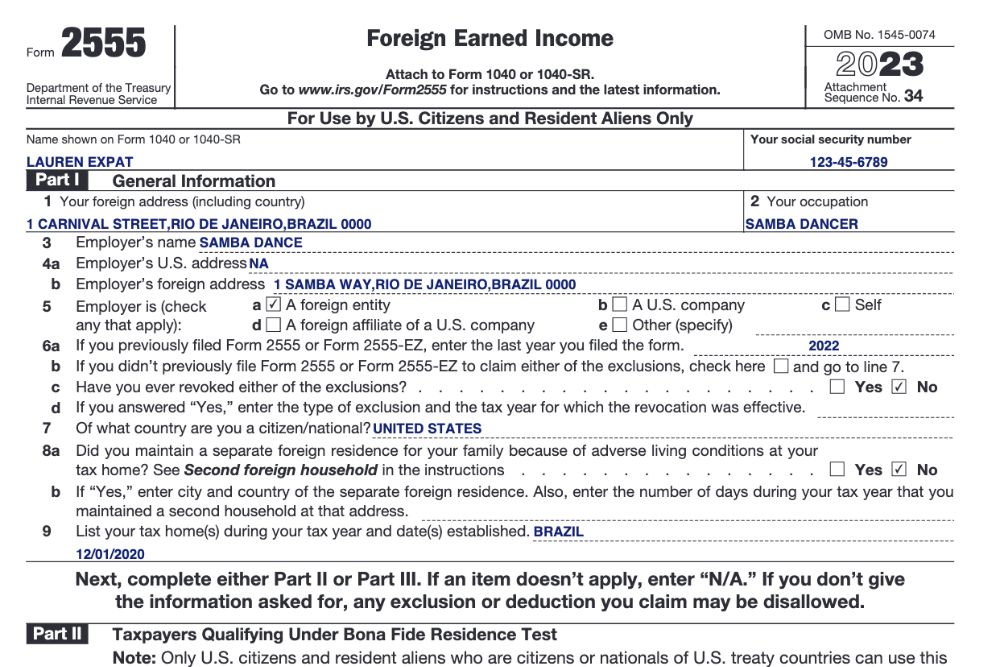Alternative Minimum Tax (AMT): A Guide for Americans Abroad

The IRS provides a variety of tax benefits for Americans living overseas. Using these benefits, most expats are able to erase their US tax bill entirely. However, in some cases, taxpayers will still be required to pay an alternative minimum tax (AMT) on their income. Here’s what you need to know about the AMT and your expat taxes.
Key Takeaways
- Some Americans are required to pay an alternative minimum tax (AMT) even if they would otherwise be exempt from taxation.
- The AMT only applies to US citizens with income above certain thresholds.
- Expats can use the Foreign Tax Credit to offset their AMT bill.
What Is the Alternative Minimum Tax (AMT)?
The Alternative Minimum Tax (AMT) is a separate tax calculation that was introduced by Congress in 1969 to ensure that high-income taxpayers pay a minimum amount of tax, even if they have access to deductions and credits that would otherwise reduce their tax liability.
The AMT calculation starts with regular taxable income and then adds back certain deductions and exemptions that are allowed under the regular tax system. This results in a higher income amount that is subject to a flat tax rate of either 26% or 28%, depending on the taxpayer’s income level.

The AMT threshold varies depending on filing status, with higher thresholds for married couples filing jointly. Taxpayers whose income exceeds the AMT threshold are required to calculate their tax liability under both the regular tax system and the AMT system and pay the higher of the two amounts.
It’s important to note that the AMT system can be complex and confusing, and taxpayers may need to work with a qualified tax professional to ensure they are meeting their obligations and maximizing their tax benefits.
Americans living abroad can also claim a variety of tax benefits, such as:
- Foreign Earned Income Exclusion
- Foreign Tax Credit
- Foreign Housing Deduction
Who Has to Pay the Alternative Minimum Tax?
Technically, every US citizen is required to pay the AMT if their tax bill falls too low after any available tax deductions are applied. The easiest way to understand the AMT is to think of it as a tax floor: it’s the bare minimum taxpayers should expect to pay on their taxes. If you would normally be taxed at a lower rate than that minimum using the standard tax scheme, then you must pay the AMT instead.
All of that is true in theory. The good news is that, in practice, most Americans never need to pay the AMT.
AMT Exemptions
The AMT has built-in exemptions based on the taxpayer’s filing status and income level. For 2024 (2023 Tax Year), the exemptions are as follows:
| Filing Status | AMT Exemption Amount |
| Single | $85,700 |
| Married, filing jointly or qualified widow(er) | $133,300 |
| Married, filing separately | $66,650 |
If your annual income falls below the exemption amount for your category, then you will be exempt from the AMT.
For example, let’s say you are living in Germany as a single taxpayer with an annual salary of $60,000. After applying the expat benefits available to you, you do not owe any US taxes under the standard tax rules. Normally, this would mean that your income would be taxed at the flat rate of the AMT instead. But because your income is less than $85,700 (the exemption amount for your filing status), you will be exempt from the AMT.
How Is the Alternative Minimum Tax Calculated?
If you are required to pay the alternative minimum tax, you will generally only be taxed on the portion of income that exceeds your exemption amount. For example, if you file as married or filing jointly, the 2024 exemption amount is $133,300. If you and your spouse’s combined income for 2023 were $150,000, the alternative minimum tax would apply to the $16,700 of your income that exceeds the exemption ($150,000 – $133,300 = $16,700).
If your annual income reaches certain thresholds, then your exemption amount will start to phase out, and the AMT will apply to income that would normally be exempted. The threshold for this phaseout will vary based on your filing status. You can see the 2024 (2023 Tax Year) phaseout thresholds below:
| Filing Status | Phaseout Begins | Phaseout Complete |
| Single | $609,350 | $952,150 |
| Married, filing jointly or qualified widow(er) | $1,218,700 | $1,751,900 |
| Married, filing separately | $609,350 | $875,950 |
Your AMT taxable income will be taxed at a flat rate of 26% or 28% depending on your filing status and income level. You can find the applicable rates for 2024 (2023 Tax Year) below:
| Filing Status | Income Level | AMT Rate |
| Single | $0 – $232,600 | 26% |
| Single | $232,600 and over | 28% |
| Married, filing jointly or qualified widow(er) | $0 – $232,600 | 26% |
| Married, filing jointly or qualified widow(er) | $232,600 and over | 28% |
| Married, filing separately | $0 – $116,300 | 26% |
| Married, filing separately | $116,300 and over | 28% |
For more details on how to calculate the AMT, see the instructions for IRS Form 6251.

Special Considerations for US Expats
Due to the numerous credits and deductions in place to help eliminate dual taxation, many US citizens living abroad can erase their US tax bill entirely. And while the AMT was previously only a concern for the very wealthy, more and more expats are finding that they are subject to this tax.
When filing your expat tax return, it is always wise to check whether you are required to pay the AMT. A qualified expat tax professional will advise you on your AMT obligations. They can also help you optimize your tax strategy to minimize your bill.
Unfortunately, if you are required to pay the AMT, you will not be able to claim certain expat tax deductions. Specifically, the Foreign Earned Income Exclusion or Foreign Housing Deduction cannot be used to offset your AMT taxable income. However, the Foreign Tax Credit is still an option even when the AMT applies.
The Alternative Minimum Tax and the Foreign Tax Credit
Expats who are subject to the AMT can claim the Foreign Tax Credit to offset their AMT bill. In this case, the Foreign Tax Credit will not apply as a dollar-for-dollar credit as it typically would—but it will help you reduce your taxes all the same. Consult an expat tax professional to learn more about your options.
If you are required to pay the AMT, you may be able to claim a Minimum Tax Credit to offset your standard taxes in any future years when the AMT does not apply. You can do this by completing and attaching IRS Form 8801.
Still Have Questions about the Alternative Minimum Tax?
We hope this guide has helped you understand how the alternative minimum tax may impact your expat taxes. If you still have questions, we have the answers.
At Greenback Expat Tax Services, we specialize in helping Americans around the world manage their US tax obligations. Just Contact us, and we’ll be happy to help you in any way we can.
If you need very specific advice on your specific tax situation, you can also click below to get a consultation with one of our expat tax experts.



